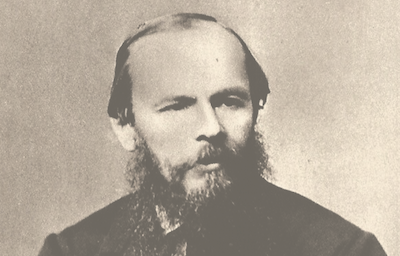During the early months of the coronavirus pandemic, readers turned to literature of pestilence: Boccaccio’s The Decameron, Defoe’s A Journal of the Plague Year, and, most of all, Albert Camus’s The Plague. But the novel that best speaks to our moment is actually Dostoyevsky’s Notes from Underground. Why? Because it argues that people are irrational, and that when given the choice, we’ll act against our best interests. And why’s that? Because we value freedom over reason.
Published in 1864, Notes from Underground is considered to be the first work of existential fiction. The second part is a dramatic narrative, but the first part is a diatribe—the rant of a bitter, forty-year-old, ex-civil servant known as the Underground Man. And the thrust of his rant is a philosophical refutation to the idea—promoted the year before in Nikolay Chernyshevsky’s novel What Is to Be Done?—that human beings will act virtuously and reasonably because doing so serves one’s own enlightened self-interest. The Underground Man argues no, there’s something dearer to man than his own best interest, and for it he’ll throw away reason, honor, peace, and prosperity. And this dearest thing is “one’s own free and unfettered volition, one’s own caprice, however wild, one’s own fancy, inflamed sometimes to the point of madness.”
To illustrate his point, the Underground Man uses the metaphor twice two equals four. He hates that. Why? Because facts and mathematical formulas leave no room for volition. There’s nothing we can do against twice two equals four. “Nature doesn’t ask you about it,” he explains, “she’s not concerned with your wishes or with whether you like her laws or not.” And so he wants to rail against it. To him, “two and two make five is also a very fine thing.”
Like today’s technologists and futurists, mid-nineteenth century intellectuals believed that society could be improved rationally, even mathematically. That we could “deduce the whole range of human satisfactions as averages from statistical figures and scientifico-economic formulas.” It was simply a question of logic, of numbers and applied technology. But Dostoyevsky didn’t think a human being’s behavior can be tabulated like an almanac. He knew something his peers did not: obstinacy and self-will mean more to us than anything else. And that out of resentment for the laws of nature, we’ll throw reason to the wind. Or as he phrases it, “Whether it’s a good thing or a bad thing, smashing things is also sometimes very pleasant.”
At one point in the book, the Underground Man claims there’s pleasure in toothache. In fact, he argues we want to have some minor pain such as a toothache. Because then we can complain about it. “People don’t suffer that in silence, of course,” notes the Underground Man, “they groan; but the groans aren’t straightforward and honest, they are spiteful, and the spite is the whole point of them.” In other words, we not only take pleasure in pain, we take pleasure in being spiteful. When told what to do, we’ll do just the opposite, simply out of spite.
By now it should be obvious that Notes from Underground answers today’s most perplexing questions. Why would someone refuse to wear a mask when this minor inconvenience is in their own and society’s best interest? Why would a down and out rural voter support a party bent on gutting the medical care that allows their survival? Why would urban protestors indulge in rowdiness and violence and thereby give their opposition a law-and-order platform? On all sides, we’re seeing behavior that’s counter-productive to one’s own goals. And the Underground Man’s rant explains why.
In an opinion essay about The Plague for The New York Times, Alain de Botton wrote, “Camus speaks to us in our own times not because he was a magical seer who intimate what the best epidemiologists could not, but because he correctly sized up human nature.” But did he? Camus may well have sized up the human condition, in the sense that “each of us has the plague within him.” Yet in Notes from Underground, Dostoyevsky wrote that the best definition of mankind is “a creature that has two legs and no sense of gratitude.”
Yes, The Plague and the Decameron describe epidemics that strikingly parallel the experience of our own. But there’s a prophetic passage in Notes from Underground that proves it’s truly the book that best captures our era. The Underground Man says he wouldn’t be surprised if, in the midst of a future of good sense, “some gentleman with an ignoble, or rather a derisive and reactionary air, springs up suddenly out of nowhere, puts his arms akimbo and says to all of us, ‘Come on, gentlemen, why shouldn’t we get rid of all this calm reasonableness with a kick, just so as to send all these logarithms to the devil and be able to live our own lives at our own sweet will?’”
What’s really mortifying, Dostoyevsky adds, is that this man would certainly find followers.
Case closed.
¤
LARB Contributor
Randy Rosenthal is the co-founding editor of the literary journals The Coffin Factory and Tweed’s Magazine of Literature & Art. His work has appeared in numerous publications, including The Washington Post, The New York Journal of Books, Paris Review Daily, Bookforum, Harvard Divinity Bulletin, The Daily Beast, and The Brooklyn Rail. He is a recent graduate of Harvard Divinity School, where he studied religion and literature, and currently teaches writing classes at Harvard.
Did you know LARB is a reader-supported nonprofit?
LARB publishes daily without a paywall as part of our mission to make rigorous, incisive, and engaging writing on every aspect of literature, culture, and the arts freely accessible to the public. Help us continue this work with your tax-deductible donation today!
